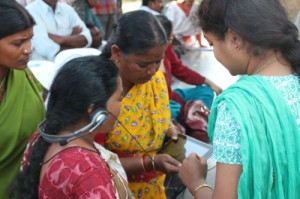Using Tablets in Rural India to Build Demand for Safe Water: A Hi-Tech Approach to Promoting Good Health | Source: by Safe Water Network, Sacramento Bee, May 20, 2013 |
Safe Water Network announced today the launch of its innovative Tablet-based water and health education campaign designed to build awareness of and demand for safe water in rural communities. In one of the first applications of this technology in such a setting, the campaign uses multiple regional dialects and culturally specific marketing content to educate community members on the benefits of safe water and its link to good health. This work is supported by Merck Foundation and builds upon a long-term partnership with Safe Water Network to accelerate the adoption and usage of safe water for drinking and cooking.
“At Merck, we are interested in understanding how innovation can be used to improve global health,” says Danielle Menture, vice president of Global Safety & the Environment at Merck. “This initiative is an excellent example of a new way to use technology to improve access to clean water.” 
Global health experts have been calling for an increased focus on behavior change for many years. Dr. Aidan Cronin, a Water, Sanitation and Hygiene Specialist at UNICEF India, recently stated, “UNICEF realizes the importance of creating awareness about safe drinking water and its multiple benefits.” Dr. Cronin views the Safe Water Network campaign as an important step forward. “In the midst of technology’s growing reach,” he says, “the Tablet campaign is an innovative program that will make people aware about water safety.”
The Tablet approach delivers standardized content which ensures that important messaging remains consistent across users and regions. According to MARI and ECO-Club, Safe Water Network’s local partners in the field, delivering safe water and hygiene messaging on a Tablet is creating a high level of excitement in rural communities. “The enthusiasm I’m met with in the village when using the Tablet allows me to connect with people quickly and hold their attention longer,” says Vedanta from MARI. “The Tablet symbolizes technology and progress; it creates a connection with their urban cousins.”
Safe Water Network’s campaign is gaining speed in unexpected ways. Opinion leaders in the village of Pathipaka are so motivated by the message and lessons, they have become advocates themselves. Rajitha, for example, is a leading health worker with ASHA in the Warangal district, and plays an important role in her community. “Women and children,” she says, “particularly young pregnant women, need to know the importance of always using safe water. In the past I’ve struggled to teach my community alone. Help has finally arrived.”
The campaign was developed in partnership with Dialogue Factory, a GroupM company that specializes in experiential marketing throughout India. The initiative builds on Safe Water Network’s “iJal” safe water brand that was designed to appeal to rural consumers. “We are proud to partner with Safe Water Network in their mission,” says Dalveer Singh, CEO of Dialogue Factory. “We believe that Tablets represent one of the most innovative and powerful tools to educate, entice and engage rural audiences.”
Over the next year, Safe Water Network will introduce additional functionality including educational video games, and an interactive “Project Assessment and Management” application to track safe water site assessments, planning, management and training.
A nine-month impact assessment completed by the consumer insight and market research firm IMRB will measure the campaign’s impact on safe water purchases as well as community attitudes towards safe water and hygiene.
About Safe Water Network
Safe Water Network’s mission is to develop innovative solutions that provide safe, affordable water to those in need. We bring together diverse capabilities to address the challenges of local ownership and sustainability. Working with the private and public sectors, we advance our field initiatives for broad replication. We also document and share this effort through forums, workshops, reports and case studies. Our water systems provide almost a quarter of a million people with safe water access in India and Ghana.



